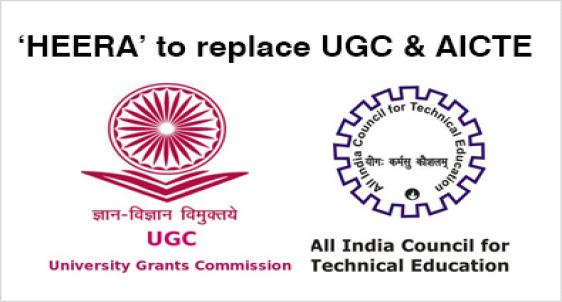
Gone will be the days to check whether your management programme is MBA – approved and recognized by UGC or is the PGDM approved by AICTE. Nor you will need to check the MBA equivalence of your PGDM programme, once it is approved and recognized by ‘HEERA’ the upcoming new higher education regulatory body.
The change has been long felt by experts but decision continued to remain pending. However, in the month of March the Prime Minister Shri Narendra Modi chaired the meeting on education and the decision to launch HEERA was taken. Till the time HEERA is launched, the necessary changes and modifications will be brought about in the existing rules and regulations of AICTE and UGC.
To bring transparency and uniformity in the Higher Education and to eliminate the overlapping of juridisction causing delays due to Tug of War between AICTE and UGC, the Ministry of HRD and Niti Aayog have started preparing a blue print to introduce new single higher education regulator ‘ Higher Education Empowerment Regulatory Authority (HEERA)’. HEERA proposes to bring the technical and non technical higher education under single roof eliminating the two parallel regulators. Government of India proposes to introduce the bill in next session of Parliament in July 2017 to get its nod.
Once implemented, reports Press Trust of India, 'The University Grants Commission (UGC) and All India Council of Technical Education (AICTE) are soon going to be a thing of the past with the government planning to replace them with a single higher education regulator.'
Related Articles:
Refund MBA fee in 7 days - AICTE guidelines; No MBA/PGDM admission allowed before April 1; admission criteria changed
AICTE discontinues 5 Year Dual Degree Programme in Management; will IIM Indore IPM be impacted?
SC grants stay to EPSI against AICTE - PGDM notification 2010; autonomy to continue for academic session 2017-18
CMAT 2016: Many B schools opt out of the list; candidates confused; AICTE yet to share the updates
HEERA to give more autonomy to B-schools
MHRD felt that multiple regulatory bodies led to excessive and restrictive regulation and hence contributed to lack of institutional autonomy. Accordingly HEERA is aimed at achieving the next level of excellence which UGC and AICTE could hardly imagine.
MHRD and Niti Aayog are drafting to launch HEERA in order to re-define and revolutionize the ‘Indian Education System’ where UGC and AICTE would become obsolete.
Need was felt for a long time
HEERA is proposed to curb irrelevant regulatory provisions. The need for such regulator especially for management education was felt for a long time by academicians and experts.
It was felt by them that Indian higher education and management education was over regulated and Management education has remained constantly under pressure from various regulators like ACITE.
Autonomy and peer regulation more important
AICTE or UGC wants to regulate almost all aspects of running a private B-school. In the 2010 notification, AICTE wanted to take away the autonomy of PGDM B-schools to admit the candidates that meet their criteria, they wanted to regulate fee, and they wanted to even prescribe a model curriculum.
B-schools can remain competitive when they are given more autonomy to differentiate themselves, think experts. At present the higher education regulators like AICTE and UGC are stuck in a pre-liberalization era. The approval and regulatory process is based on meeting Infrastructure requirements, and doesn't measure the quality of the programs. The launch of HEERA is expected to help quality to improve and benefit all stakeholders.
Objectives of ‘HEERA’
With the launch of HEERA the monopoly and somewhat irrational regulatory regime of UGC and AICTE would be gone.
- Better regulatory provisions will be implemented that will eliminate the unruly old ones
- HEERA would break the authoritarian regime of UGC and AICTE
- More autonomy would be available to the B-schools
- In view of academicians, faculty and deans as well as corporate leaders, Indian Higher Education system is poorly managed & badly regulated. HEERA may provide some breathing space to them by bringing about better regulations.
- HEERA would take care of earlier anomalies and shortcomings
- HEERA will be a single regulator instead of present multiple ones for technical or non-technical institutions.
- Better criteria for ranking will be followed
- HEERA aims to bring about improved and better quality assessment system
- Research environment and grant of funds will be easier to get for improvement in quality improvement in students and faculty.
Stay tuned to MBAUniverse.com for more updates on Higher Education Empowerment Regulatory Authority (HEERA)
Also See -
Top MBA colleges: Find the best MBA colleges in India across the regions with cut off, fee and placement
MAHCET MBA exam: Know all about MAHCET exam and MBA admission process in 400 B-schools
MBA through KMAT 2017: All about the last MBA entrance exam for admission in 2017 in Bangalore & rest of Karnataka
PGCET 2017: Karnataka Govt PGCET 2017 on July 2 for MBA 2017 open for all category candidates
CAT 2017 in changed pattern: Know all about CAT 2017 exam notification date, registration, pattern, IIM cutoffs
MBA Ranking 2017: Check MBA Ranking 2017 for top 100 B-schools in India to guide you in MBA admission decision



























